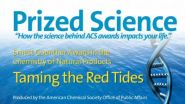(Press-News.org) Prostate cancer patients who are treated with a combination of hormone therapy and radiation have a substantially improved chance of survival compared to patients who do not receive radiation, according to interim results of the largest randomized study of its kind presented at the plenary session, November 1, 2010, at the 52nd Annual Meeting of the American Society for Radiation Oncology (ASTRO).
From 1995 to 2005, 1,205 men with high-risk prostate cancer in the United States, the United Kingdom and Canada were randomly selected to receive hormone therapy alone or a combination of hormone therapy and radiation treatment and were followed for at least six years on average. The study was jointly conducted by the National Cancer Institute of Canada, the United Kingdom Medical Research Council and the Southwest Oncology Group in the United States.
Interim results of the study show that the addition of radiation therapy significantly decreased the risk of death among these patients. There were also no increased long-term side effects associated with the treatment. The independent data monitoring committee recommended the release of these results for presentation in view of their importance. The final analysis will be released after further follow-up with the patient group.
"If the figures from the interim analysis are similar to the final analysis, we would expect a 43 percent reduction in the chances of death from prostate cancer in men with this regimen," Malcolm Mason, M.D., lead author of the study and a radiation oncologist at Cardiff University in Cardiff, Wales, United Kingdom, said. "This would translate into a reduction in the chances of deaths from prostate cancer in many thousands of men worldwide."
There is much variation in the treatment for men with localized, high-risk prostate cancer and it is a hotly debated topic. While the number of men treated with combined hormone and radiation therapy has increased in recent years, there are still many patients treated with hormone therapy alone.
This multicenter, randomized trial examined the effects of external beam radiation treatment added to lifelong androgen deprivation therapy for prostate cancer patients who had a high risk of the cancer returning after treatment.
During external beam radiation therapy, radiation beams are directed through the skin to the prostate and the immediate surroundings to destroy the main tumor and any nearby cancer cells. The treatments are outpatient and generally painless, much like receiving an X-ray. Side effects most often reported are mild bowel and bladder problems. Patients typically do not experience hair loss or nausea like with some other treatments.
Androgen deprivation therapy is hormone therapy used to treat prostate cancer by lowering the level of male hormones (androgens) to shrink the prostate or slow down the growth of prostate cancer.
"This study is practice changing as it highlights the importance of radiation in the treatment of high-risk prostate cancer patients and clearly demonstrates its benefits," Dr. Mason said. "It shows that the standard treatment for these patients should now be hormone therapy plus radiation."
###
For more information on radiation therapy for prostate cancer, visit www.rtanswers.org.
The abstract, "Intergroup Randomized Phase 3 Study Of Androgen Deprivation Therapy (ADT) + Radiation Therapy (RT) In Locally Advanced Prostate Cancer (CaP) (NCIC-CTG, SWOG, MRC-UK, INT: T94-0110; NCT00002633)," will be presented at the plenary session at 2:30 p.m. on Monday, November 1, 2010. To speak to the lead author of the study, Malcolm Mason, M.D., please call Beth Bukata or Nicole Napoli on October 31 - November 2, 2010, in the ASTRO Press Room at the San Diego Convention Center at 619-525-6313 or 619-525-6314. You may also e-mail them at bethb@astro.org or nicolen@astro.org.
END
WASHINGTON, Oct. 25, 2010 — Green gasoline is plants in your tank, motor vehicle fuel made from corn, cornstalks, sugarcane, and other crops. It also is gasoline made with recipes that reduce the need for harsh, potentially toxic ingredients like hydrofluoric acid or sulfuric acid that are used at about 210 oil refineries worldwide. Now scientists have found an answer to a half-century quest for a way to make gasoline in exactly that kind of greener, more environmentally-friendly way.
That advance highlights the second episode of a new video series, Prized Science: ...
Men with prostate cancer treated with a specialized type of radiation called intensity modulated radiation therapy (IMRT) have fewer gastrointestinal complications compared to patients treated with conventional three-dimensional conformal radiotherapy (3D-CRT), according to a study presented November 1, 2010, at the 52nd Annual Meeting of the American Society for Radiation Oncology (ASTRO).
"With survivors living many years after treatment, it is very important to minimize gastrointestinal and urinary side effects to allow patients to live a full life after treatment," ...
A lower dose of radiation used to reduce side effects is not as effective as the regular dose when given with the standard chemotherapy in the treatment of Hodgkin's lymphoma patients with early, intermediate-stage disease, according to a first-of-its-kind randomized study presented at the plenary session, November 1, 2010, at the 52nd Annual Meeting of the American Society for Radiation Oncology (ASTRO).
In addition, the trial showed that a more intensive chemotherapy (BEACOPP) is not more effective than the standard chemotherapy treatment (ABVD) for these patients.
"This ...
BOSTON (October 25, 2010) — Researchers from Tufts University pooled data from five previous epidemiological studies to investigate the prevalence of asthma in children in the Boston neighborhoods of Chinatown and Dorchester. Among children born in the United States, low socioeconomic status (SES) and exposure to pests (mice and cockroaches) were both associated with having asthma. Neither association was present in children born outside of the United States. The study was published online in advance of print in the Journal of Immigrant and Minority Health.
"In earlier ...
Adding chemotherapy to radiation therapy for muscle invasive bladder cancer allows 67 percent of people to be free of disease in their bladders two years after treatment. This compares to 54 percent of people who receive radiation alone, according to the largest randomized study of its kind presented at the plenary session, November 1, 2010, at the 52nd Annual Meeting of the American Society for Radiation Oncology (ASTRO).
"The trial shows that this treatment offers improved control of cancer within the bladder with acceptable long-term side effects and is therefore a ...
Stereotactic radiation is an effective, long-term treatment for trigeminal neuralgia: a painful condition that occurs with increased frequency in patients with multiple sclerosis (MS). Radiation is noninvasive and has less negative side effects than other treatments, according to the longest follow-up in a study of its kind presented October 31, 2010, at the 52nd Annual Meeting of the American Society for Radiation Oncology (ASTRO).
Multiple sclerosis is a progressive neurological disease affecting about 300,000 Americans where the body's immune system attacks its own ...
Laxenburg, Austria – 26th October 2010 --
A new assessment of future scenarios that limit the extent of global warming cautions that unless current imbalances in R&D portfolios for the development of new, efficient, and clean energy technologies are redressed, greenhouse gas (GHG) emission reduction targets are unlikely to be met, or met only at considerable costs.
The study identifies energy efficiency as the single most important option for achieving significant and long-term reductions in GHG emissions, accounting for up to 50 percent of the reduction potential across ...
ITHACA, N.Y. – The human hand is an amazing machine that can pick up, move and place objects easily, but for a robot, this "gripping" mechanism is a vexing challenge. Opting for simple elegance, researchers from Cornell University, University of Chicago and iRobot have bypassed traditional designs based around the human hand and fingers, and created a versatile gripper using everyday ground coffee and a latex party balloon.
They call it a universal gripper, as it conforms to the object it's grabbing rather than being designed for particular objects, said Hod Lipson, ...
In scientific publishing, how much reuse of text is too much? Researchers at the Virginia Bioinformatics Institute at Virginia Tech and collaborators have shown that a computer-based text-searching tool is capable of unearthing questionable publication practices from thousands of full-text papers in the biomedical literature.
The first step in the process is to find out what is restated before zeroing in on who may have crossed an ethically unacceptable threshold. The findings, published in PLoS ONE, offer hope for curbing unethical scientific publication practice, ...
VIDEO:
This video contains more on the pediatric bone cancer preclinical study.
Click here for more information.
BOSTON - Researchers have identified an important signaling pathway that, when blocked, significantly decreases the spread of pediatric bone cancer.
In their study, researchers at The University of Texas MD Anderson Children's Cancer Hospital in Houston found that blocking the Notch pathway in mice decreased metastases in the lungs 15-fold. The results of ...

